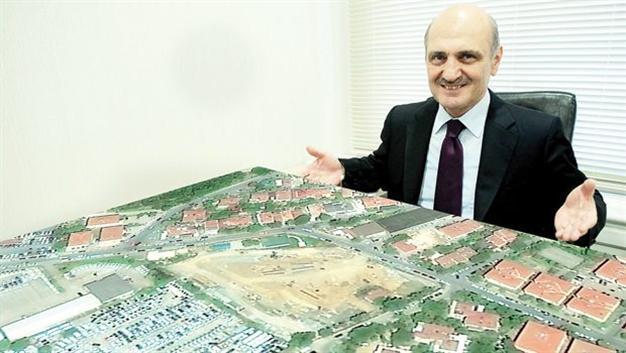Former Turkish minister cashes in with urban transformation
Gülistan Alagöz ISTANBUL

The only ‘risky’ building on the otherwise empty land has already been demolished for the ‘Elysium Elit Koşuyolu’ residence project. According to the developer, the ongoing construction will be completed by the end of 2016 and the new apartments will be sold for $4,300 per square meter.
The family of Erdoğan Bayraktar, who was implicated in the massive corruption probe in December 2013, has earned up to 72.4 million Turkish Liras ($27.6 million) thanks to an urban transformation project pushed by Bayraktar during his tenure as the Environment and Urbanization Minister.
The company run by the Bayraktar family bought a 10,000-square-meter plot of land in Istanbul’s Koşuyolu neighborhood for $22 million in 2013. The former minister had said at the time that there was no conflict of interest, describing the purchase as “an innocent investment.”
However, the family recently sold the land to a developer for 114.4 million Turkish Liras ($43.9 million), daily Hürriyet has learned. The massive profit that the Bayraktars earned in just two years is thanks to a recent change in the legal status of the plot.
Earthquake risk being abusedThrough a law accepted in parliament in 2012, the Turkish government incentivizes home owners in urban areas at a higher risk of natural disasters, particularly earthquakes, to rebuild their residences. Bayraktar was one of the champions of the bill during his tenure at the ministry.
However, Turkish media recently reported that the law has been abused throughout Turkey for many home owners, as reconstruction efforts have been focused more on lucrative plots near city centers, instead of places where the earthquake risk is much higher.
In the second quarter of 2014, the Bayraktar family reached an agreement with Ofton İnşaat, a Turkish construction firm, to develop their plot in Koşuyolu. Soon after, the administration changed the legal status of the plot and included it in the urban transformation zone, citing it as an earthquake risk despite the fact that there was only one abandoned building on the otherwise empty land.
Lucrative change in legal statusWith the status change, the landowners and the developer will be paying only 1 percent value-added tax as an incentive, instead of the regular 18 percent.
Speaking to daily Hürriyet on March 5, Ofton İnşaat Co-Chair İsmail Hakkı Altun said the Bayraktar family, not his company, would be benefiting from the agreement the most. “We expect to earn revenue of $80 million from our real estate project,” Altun said, adding that 55 percent of it would be going to the Bayraktars.
As such, the former Turkish minister and his family will gain a net profit of 72.4 million liras only two years after their investment.
Accusations of increased wealthAlong with three other ministers, Bayraktar was implicated in a massive graft probe in December 2013.
The ruling Justice and Development Party (AKP) declared that the investigation was a fabricated plot aiming to topple the government, and the criminal investigations into the probe were aborted before parliament refused to send the four ministers to Turkey’s top court for trial, thanks to the votes of the AKP.
Before the vote, the parliamentary commission had questioned a sudden increase in Bayraktar’s wealth on the back of allegations that he had accepted bribes. Bayraktar’s family company increased its wealth from 17.5 million liras in 2010 to 58.2 million liras in 2013, according to the inquiry.
Answering whether it was ethical to be a shareholder of a company while he was a parliamentarian, Bayraktar said deputies and ministers owning shares was ethically and legally unproblematic.
“There are deputies in parliament who have huge amounts of shares in big companies. It is the same in other countries too,” he said.
